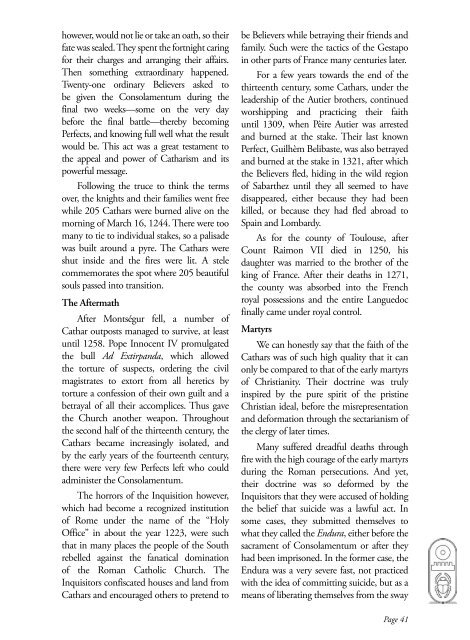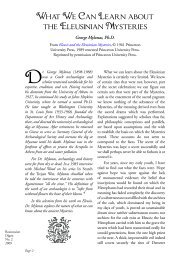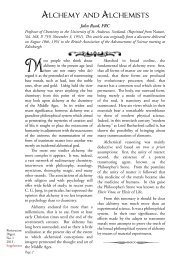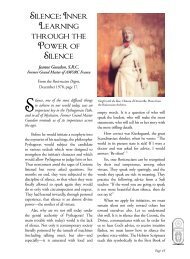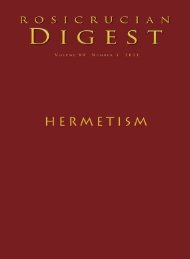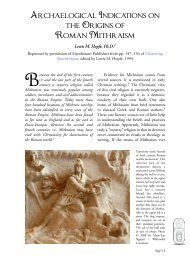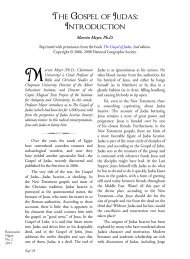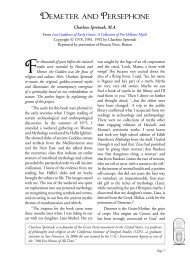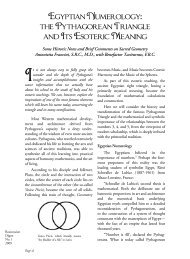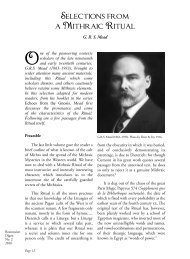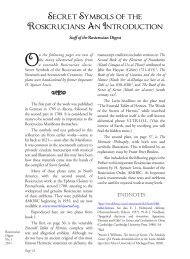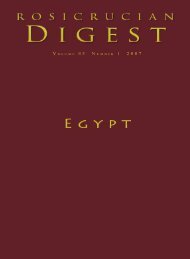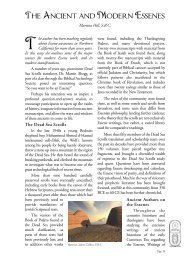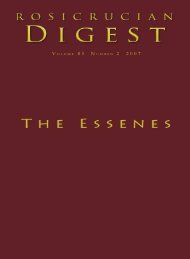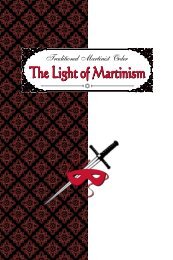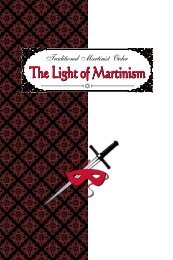Rosicrucian Digest Vol 89 No 2 2011 Gnosticism - Rosicrucian Order
Rosicrucian Digest Vol 89 No 2 2011 Gnosticism - Rosicrucian Order
Rosicrucian Digest Vol 89 No 2 2011 Gnosticism - Rosicrucian Order
Create successful ePaper yourself
Turn your PDF publications into a flip-book with our unique Google optimized e-Paper software.
however, would not lie or take an oath, so their<br />
fate was sealed. They spent the fortnight caring<br />
for their charges and arranging their affairs.<br />
Then something extraordinary happened.<br />
Twenty-one ordinary Believers asked to<br />
be given the Consolamentum during the<br />
final two weeks—some on the very day<br />
before the final battle—thereby becoming<br />
Perfects, and knowing full well what the result<br />
would be. This act was a great testament to<br />
the appeal and power of Catharism and its<br />
powerful message.<br />
Following the truce to think the terms<br />
over, the knights and their families went free<br />
while 205 Cathars were burned alive on the<br />
morning of March 16, 1244. There were too<br />
many to tie to individual stakes, so a palisade<br />
was built around a pyre. The Cathars were<br />
shut inside and the fires were lit. A stele<br />
commemorates the spot where 205 beautiful<br />
souls passed into transition.<br />
The Aftermath<br />
After Montségur fell, a number of<br />
Cathar outposts managed to survive, at least<br />
until 1258. Pope Innocent IV promulgated<br />
the bull Ad Extirpanda, which allowed<br />
the torture of suspects, ordering the civil<br />
magistrates to extort from all heretics by<br />
torture a confession of their own guilt and a<br />
betrayal of all their accomplices. Thus gave<br />
the Church another weapon. Throughout<br />
the second half of the thirteenth century, the<br />
Cathars became increasingly isolated, and<br />
by the early years of the fourteenth century,<br />
there were very few Perfects left who could<br />
administer the Consolamentum.<br />
The horrors of the Inquisition however,<br />
which had become a recognized institution<br />
of Rome under the name of the “Holy<br />
Office” in about the year 1223, were such<br />
that in many places the people of the South<br />
rebelled against the fanatical domination<br />
of the Roman Catholic Church. The<br />
Inquisitors confiscated houses and land from<br />
Cathars and encouraged others to pretend to<br />
be Believers while betraying their friends and<br />
family. Such were the tactics of the Gestapo<br />
in other parts of France many centuries later.<br />
For a few years towards the end of the<br />
thirteenth century, some Cathars, under the<br />
leadership of the Autier brothers, continued<br />
worshipping and practicing their faith<br />
until 1309, when Pèire Autier was arrested<br />
and burned at the stake. Their last known<br />
Perfect, Guilhèm Belibaste, was also betrayed<br />
and burned at the stake in 1321, after which<br />
the Believers fled, hiding in the wild region<br />
of Sabarthez until they all seemed to have<br />
disappeared, either because they had been<br />
killed, or because they had fled abroad to<br />
Spain and Lombardy.<br />
As for the county of Toulouse, after<br />
Count Raimon VII died in 1250, his<br />
daughter was married to the brother of the<br />
king of France. After their deaths in 1271,<br />
the county was absorbed into the French<br />
royal possessions and the entire Languedoc<br />
finally came under royal control.<br />
Martyrs<br />
We can honestly say that the faith of the<br />
Cathars was of such high quality that it can<br />
only be compared to that of the early martyrs<br />
of Christianity. Their doctrine was truly<br />
inspired by the pure spirit of the pristine<br />
Christian ideal, before the misrepresentation<br />
and deformation through the sectarianism of<br />
the clergy of later times.<br />
Many suffered dreadful deaths through<br />
fire with the high courage of the early martyrs<br />
during the Roman persecutions. And yet,<br />
their doctrine was so deformed by the<br />
Inquisitors that they were accused of holding<br />
the belief that suicide was a lawful act. In<br />
some cases, they submitted themselves to<br />
what they called the Endura, either before the<br />
sacrament of Consolamentum or after they<br />
had been imprisoned. In the former case, the<br />
Endura was a very severe fast, not practiced<br />
with the idea of committing suicide, but as a<br />
means of liberating themselves from the sway<br />
Page 41


